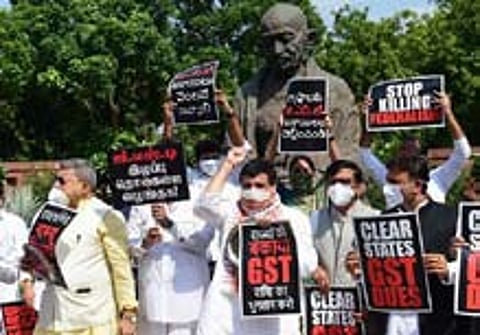

States agitating against the Centre’s alleged discriminatory treatment against them is not a positive development. However, the Constitution anticipated such disputes and has provided for institutional arrangements to resolve them. The National Development Council set up in 1952 and the Inter-State Council set up in 1990 under Article 263 are the two major arrangements to resolve such disputes and enhance cooperation. What does the new phase of disenchantment signify? Is it that the established instruments are unable to tackle the emerging challenges? Or is it that the spirit of the Constitution has been tarnished by partisan and discriminatory politics?
The Centre-state relationship pivots on the federal structure that functions on the basis of cooperation and collaboration. Without the instrumentality of the states, the implementation of several central schemes is bound to face a setback. Similarly, an adversarial relationship is bound to have financial repercussions for the state. The fact that several states feel deprived of their due share of the central kitty and constrained by discriminatory approaches cannot be brushed aside as political optics. There is not only no geographical divide as has been alleged, but the sentiment of injustice is shared across regions. It is common to West Bengal, Tamil Nadu, Rajasthan (during the time of Ashok Ghelot government), Kerala, Karnataka and Punjab. Almost all non-BJP-ruled states are aggrieved.
The central government cannot wash its hands of this mess. The root lies not in superficial discrimination on political lines but in the philosophy of hyper-centralisation, religiously practiced by this government at the Centre. The inherent faith in one nation-‘one-everything’ goes against the very grain of federalism. This preference for centralisation and uniformity is evident in the various initiatives of the central government.
Natural justice demands that when the Goods and Services Tax is introduced, the states would be treated in a fair manner. The benefits of streamlining tax collection should have trickled down to the states in the form of higher tax revenues. If this feel-good factor is missing in several states, such disenchantment has to be tackled with statesman-like breadth of vision and empathy. rather than through the narrow lens of party politics and electoral logic.
It is a pity that states are being denied developmental funds for trivial reasons like not having designated spaces for selfie with PM at ration shops. There have been statements in the media that some states are renaming central government schemes and are claiming credit, using central funds. A greater respect for each other that goes beyond the political differences is well advised. It does not make us proud that after 77 years of Independence, responsible governments are still making infantile mistakes.
The states have only limited options if the central government continues to be guided by its centralising impulse. An option available within the constitutional matrix is to use the existing provision of the Inter-State Council more imaginatively and proactively. So far, the functioning of the Inter-State Council and NDC has been perfunctory with no worthwhile deliberations or any remarkable outcome. In such forums every state reiterates its known position along their political (or ideological) lines. It is high time the utility of these forums is reinvented with greater pragmatism.
The agenda-setting exercise of both NDC and Inter-State Council meetings has been routine with the governments treating such occasions as sterile. Political leadership at the states has to take a closer look at these constitutional provisions and take the fullest advantage of them in their true spirit. Evidently, these forums are free to discuss and deliberate any subject that affects the relationship between the states and the Centre. That includes financial and developmental aspects. The aggrieved states should come together to air their grievances and force the central government to correct the discrepancies.
The central government may be financially strong, but the fact remains that this strength emanates from the taxpayers who are residing in these states. A financially strong central government and poor states is an anachronism. It cannot be. The central government has to whole-heartedly admit that all its prosperity has its source from these states, lawfully brought under its domination. The states are only demanding their fair share that has been withheld on purely technical and flimsy grounds.
It is not the states that stand discredited in this imbroglio, but the Centre that basks in the glory of temporary victory. They do not know about the serious damage being done to the federal fabric of this country. The central government is truly a trustee and any trustee should be ashamed to have betrayed the trust. The mood of discontent prevalent in the non-BJP-ruled states is more a manifestation of the central government’s myopic political calculus and centralising instinct rather than the financial mismanagement of the states as repeatedly and dismissively concluded by the Centre.
Both the Centre and the State governments must read the relevant provisions of the Constitution with a fresh mind and unleash the latent power and potential of Article 263 and allied provisions and the NDC.
K Jayakumar, Former Kerala chief secretary and ex-VC Thunchath Ezhuthachan Malayalam University
(Views are personal)